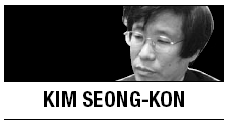Early modern architecture has greatly influenced not only the arts but also society as a whole today. Its effects, however, have not been advantageous but detrimental for many, contributing mostly to the dehumanization of society.
One distinctly negative characteristic of architectural modernism is its emphasis on efficiency and simplicity. Following the notion that “form follows function,” a phrase originally coined by Frank Lloyd Wright’s mentor Louis Sullivan, modern architects began building structures that were highly functional and efficient as opposed to the lavish and excessive styles of the past.

Eliminating unnecessary details and spaces, however, oftentimes resulted in harsh, machine-like structures and buildings. Eventually, modernist architecture led to the dehumanization of the arts and life itself, seriously lacking leeway that would give a building a warm human touch.
Unfortunately in Korea, the specters of modern architecture seem to be reappearing, spreading its influence well beyond architectural structures. Currently under the catchphrases “unlimited competition” and “market economy,” Korean society is blindly seeking “efficiency” once again, rapidly regressing towards dehumanization.
Even in bookstores, which should be different from ordinary profit-seeking companies, a seemingly unattainable sales target is ruthlessly imposed on each sales team. If a team fails to achieve the requirement, the team members must suffer the consequences.
Take for example a sales manager in charge of the humanities section for a bookstore. Concerned with profit margins only, he or she may display only the bestselling books in their particular section, regardless of the content and quality.
Hospitals are similarly controlled and managed like many of the Korean companies as well. Reports reveal that in many general hospitals, doctors are evaluated and given a certain salary level depending on how much profit they have brought into the hospital. That is why doctors often strongly advise their patients to be hospitalized even when it is not absolutely necessary.
Rumors say that they also often refer their patients to other doctors in different departments as well, even though their patients seem to have no particular medical problems. This is due to the fact that referrals also contribute toward higher profits for the hospital.
Under these types of circumstances, the patient’s health becomes a secondary concern for the doctors. As a result, patients in Korea frequently fall victim to inhumane practices within a hospital, despite the level of skill and expertise of their doctors.
Universities are no exception to this process of dehumanization as well. Professors, for example, are evaluated and given a salary depending on the number of publications and amount of research funds they bring to the university. These efficiency-based mechanical evaluation processes inevitably create an inhumane atmosphere on campus; younger professors, who want to be promoted or tenured, compete with each other and regard their fellow faculty members not as colleagues to work with but as enemies to defeat and destroy in order to survive and thrive. Consequently, even universities, where professors teach the value of humanism and humanity, are being hopelessly dehumanized as well.
College students also fall prey to a dehumanizing system called the “Relative Evaluation Grading System.” According to this system, which deprives professors of the right to give out grades freely, a professor is required to allocate As to only 20 percent of students, Bs to 30 percent, and Cs and Ds to the remaining 50 percent.
A more generous system would enable professors to give out slightly more As and Bs to up to 60 percent, to those who truly deserved it. Still, it is an undeniably inhumane system, mechanically arraying students in a row.
Unfortunately, professors cannot ignore or challenge this inhumane evaluation system because the equally inhumane computer will not accept a different distribution of grades.
It is rare to see someone today unaffected by the dehumanizing systems of our society. A few days ago, an LG technician visited my house to fix a leaky refrigerator. He was a friendly, young man who not only fixed my fridge but also graciously volunteered to take care of my washer’s minor problems as well.
Looking at his bright smile and friendly manners, I felt the warmth of his humanity. I soon realized, however, that even the friendly technician was not completely free from the dehumanizing system of our corporations; a customer service supervisor would later call me to evaluate the technician’s service. Afterwards, I could not help but feel sorry for him because he too was being helplessly chained to the inhumane, ruthless system of evaluation, regardless of his good personality and outstanding skills.
We currently live in a rapidly and radically dehumanizing society. As a result, we are inexorably losing our human touch, and instead living in a machine-like environment. But we are not machines; we are humans, made of flesh and blood. And we have emotions and feelings that make us human. As Mahatma Gandhi said, “You must not lose faith in humanity. Humanity is an ocean; if a few drops of the ocean are dirty, the ocean does not become dirty.”
By Kim Seong-kon
Kim Seong-kon is a professor of English at Seoul National University and president of the Literature Translation Institute of Korea. ― Ed.








